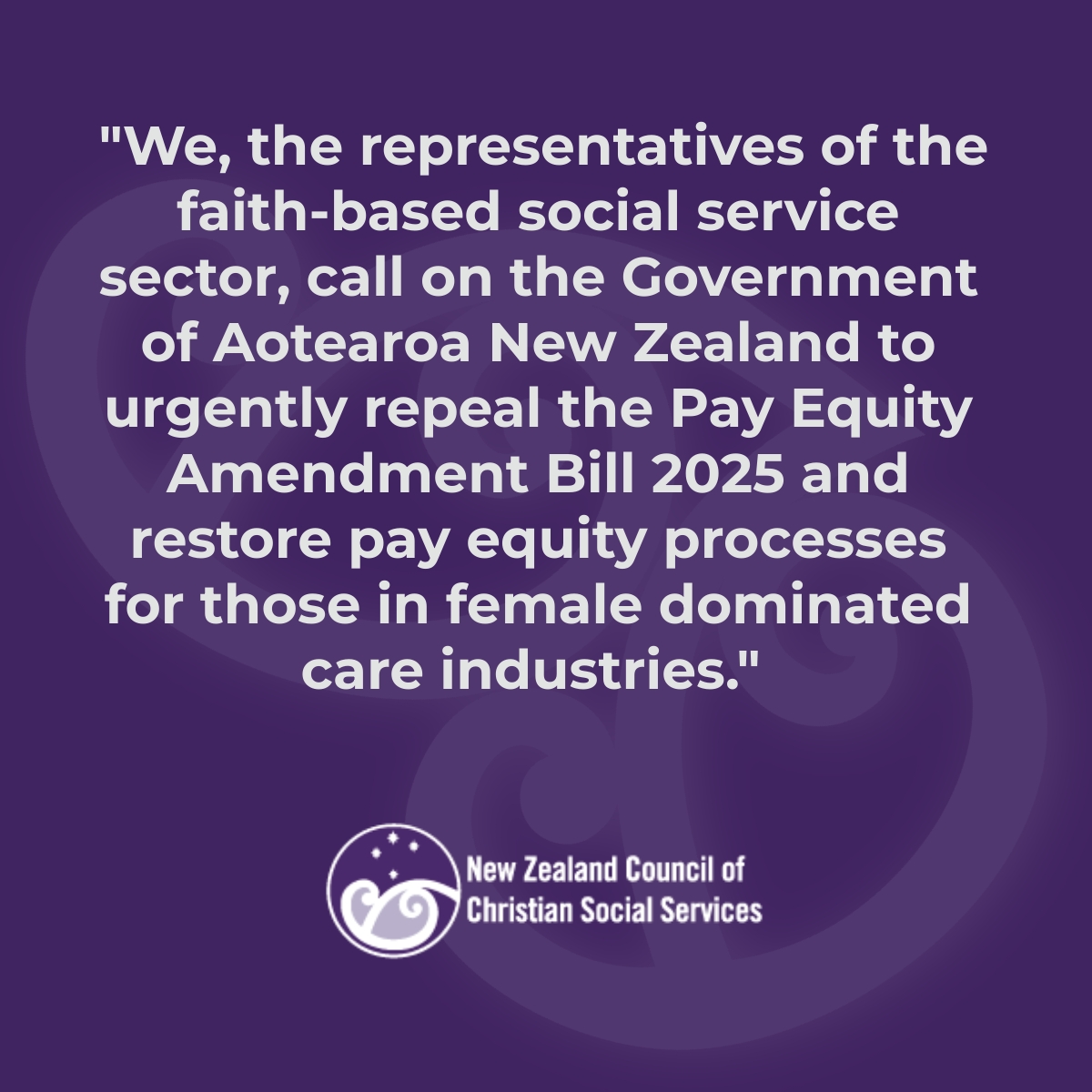Tirohanga Whānui | Overview
The New Zealand Council of Christian Social Services (NZCCSS) welcomes the opportunity to provide feedback to the People’s Select Committee on Pay Equity. With the support of 21 of our member organisations we represent, we recently wrote an open letter to Ministers calling for the repeal of the Pay Equity Amendment Bill 2025 (the Bill). This submission is a further call for an urgent repeal of the Bill.
Our main points are:
The work of carers for our most vulnerable New Zealanders will remain undervalued
NZCCSS represents organisations that deliver support for families facing disadvantages and challenges, for tamariki and rangatahi by providing opportunities and support, and for our older people who need care and assistance. Social service providers are critical to a thriving Aotearoa. These organisations and their hard-working staff deserve to be paid fairly and have the value of their mahi recognised.
The changes passed in the Bill undermine the social sector by failing to recognise and value the work of kaimahi who care for New Zealanders.
The Bill is harmful for key social sector workforces
Caregiving and social service work has been consistently undervalued by sex-based discrimination. These professions have been considered ‘women’s work’ and have female dominated workforces.
The government as a primary funder for the sector has played a key role in failing to recognise the sex-based pay inequities and in keeping wages depressed. It has an obligation and the power to correct this. The Bill has significantly undermined progress on this.
The Bill failed to meet the Crown’s Treaty of Waitangi / te Tiriti obligations
The changes to this bill were passed under urgency without consultation with Māori with no analysis completed to see if it is consistent with the principles of te tiriti [1]. Māori wāhine are disproportionately represented in roles that are likely to be negatively impacted by these changes [2]. Consultation with Māori on matters that directly affect Māori is a basic expectation of the governments te Tirtiti obligations and such a clear disregard of these, with failure to pursue equity for Māori workforces is a breach of these obligations [3].
The changes to pay equity legislation will undermine progress for working women in New Zealand
New Zealand has always been a leader for women’s rights, including democratic participation and representation. Yet women remain penalised by the gender wage pay gap and are underpaid compared to men in New Zealand, with substantially higher gaps for wāhine Māori, Pacific and Asian women, and disabled women. This Pay Equity Amendment Bill that was passed under urgency will create another barrier for equal rights and equal pay for women in New Zealand.
This decision will take working women’s rights backward. Many families in New Zealand are already facing challenges with cost-of-living pressures, particularly as minimum wage no longer keeps pace with inflation, and main benefits no longer keep up with wage growth. We want the Government to recognise the valuable work of women and others in female-dominated industries by investing in equitable wages.
The pay equity legislation process was undemocratic
Pay equity legislation and processes have been decades in the making, yet progress was undone in a matter of days without a full legislative process. Passing the Bill under urgency without any select committee or public consultation has taken away the voice of workers and the general public. This action was not campaigned on by the political parties now in Government and was not signalled in this Government’s Quarterly Plan [4]. This blindsided the sector and undermined our faith that our voices will be heard in the legislative progress.
We recognise that there were issues with the current pay equity system. However, the Government didn’t take the time to clearly articulate these and hear public feedback on the issues. Not having the opportunity to provide feedback and input into such fundamental legislative change does not align with New Zealand’s democratic process and the values of community and freedom of speech that we uphold as a nation.
Ceasing existing pay equity claims fails to recognise the hard work that has gone into claims
The scrapping of 33 active pay equity claims is a devastating blow for the huge number of people who had worked on these claims [5]. Experts and advocates have invested their time and energy into this process only to have their claims halted without warning, consultation or engagement. In the social sector this means that social service workers, care and support workers and other health workers who spent time above and beyond servicing their communities to contribute to this process have had their hard work ignored.
The removal of pay equity claims already underway is highly disruptive
The practical impacts of the changes are highly disruptive. A number of pay equity claims such as the social workers’ claim have been recently settled. A claim for other social sector workforces was in train. The social worker’s settlement created pay disparities within social service organisations as only some workers qualified. The claim that was extinguished by the Bill was going to rectify this. Now social service providers face significant unfunded pressure from their workforces to resolve pay relativities within their organisations.
The requirement for a comparator within the same sector is unworkable.
The Bill requires new claims to use comparators within the same sector. This makes it difficult to find fair comparators where entire sectors are female dominated. This has a particularly strong impact on the aged care sector and home and community care, as these sectors are overwhelmingly staffed by women. When there are no realistic comparators within the same sector to make pay equity comparisons with, it is much harder for a claim to be progressed regardless of the merit of the claim itself. This will act to keep a distinct barrier between the pay levels of different parts of the same clinical workforce and compromises the ability for aged care homes to attract and retain qualified staff. The restrictiveness of the new regime makes pay equity much harder to achieve and its impacts more widespread.
Taunakitanga | Recommendations
We urge the Committee to:
- recommend that the Bill is repealed
- challenge Parliament to honour the Crown’s obligations under Te Tiriti for genuine partnership and engagement with Māori.
- highlight the unfair restrictions enacted by the Bill
- recommend that broader comparators be used as appropriate to the circumstances.
- challenge the retrospective nature of the Bill and recommend the restoration of the claims that were already underway.
- challenge the undemocratic nature of the process for changing this legislation.
- Support the eight core components for rebuilding a fair, accessible and enduring fair pay system as outlined in the submission from Te Pai Ora SSPA.
Ngā Tohutoro | References
[1] https://disclosure.legislation.govt.nz/bill/government/2025/147
[2] https://hapai.co.nz/pay-equity-changes-passed-under-urgency-wahine-maori-carry-the-cost/
Ko wai tātou | Who we are
NZCCSS has six foundation members; the Anglican Care Network, Baptist Churches of New Zealand, Catholic Social Services, Presbyterian Support and the Methodist and Salvation Army Churches.
Through this membership, NZCCSS represents over 100 organisations providing a range of social support services across Aotearoa. Our mission is to call forth a just and compassionate society for Aotearoa, through our commitment to our faith and Te Tiriti o Waitangi.
Further details on NZCCSS can be found on our website – www.nzccss.org.nz.
Ingoa whakapā | Contact Name
Alicia Sudden [email protected]
Dr Katie Schraders
Daniel Campbell

